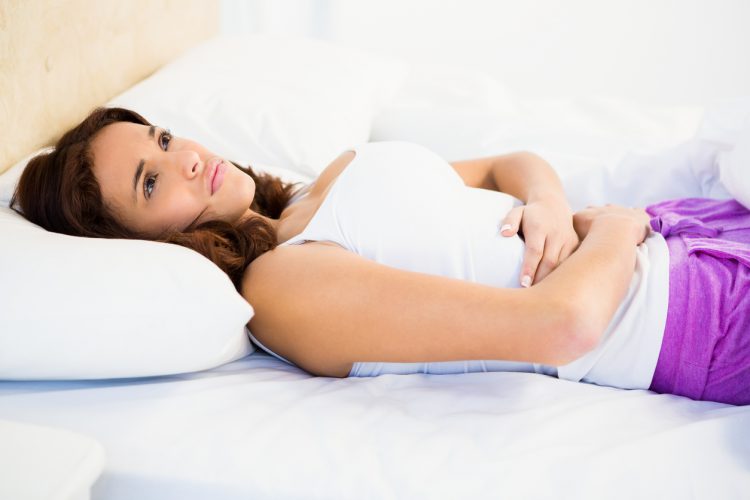Project Description
9 Reasons You Might Not Get Your Period—That Aren’t Pregnancy
Alison Zimon, MD, an OBGYN and reproductive endocrinologist at CCRM Boston, cautions that there are several reason why your periods could become irregular or stop, some of them serious, so you should never ignore it.
“If periods don’t come for several months, that would be a reason to see a physician,” she says. One common occurrence is with serious athletes, who often find their periods stop when they’re in training. The body goes into “starvation” mode to conserve energy, and prevents pregnancy—which would demand more nutrients from the body—by dropping production of estrogen.
Estrogen and progesterone are two important hormones for ovulation. If the body doesn’t ovulate, the uterus has no need to prepare for possible pregnancy by thickening the lining of the womb, and periods stop.
(If your period does show up accompanied by pain, try these exercises for period pain.)
Under-nourished
The body reacts in a similar way if you don’t provide it with a healthy balanced diet. Sometimes people combine a rigorous exercise program with a restricted diet in an effort to get ‘lean and clean’, which hits the reproductive system with a double whammy.
Vegetarian diets with a poor balance of nutrients can also cause periods to stop; so can eating disorders, in which a woman eats very little or follows a severely restricted diet. You may have a problem and not realize it—check out these 11 silent signs you might have an eating disorder. And limiting your diet can also lead to other health complications down the line, such as osteoporosis, fatigue, brittle hair and nails, skin problems, and decline in cognitive function.
Excessive or prolonged stress
Excessive and prolonged stress can interfere with the efficient functioning of the hypothalamus. This area of the brain controls the pituitary gland, which in turn releases estrogen and progesterone.
Dr. Zimon explains the impact on the reproductive cycle: “That’s the driving signal that allows a women to develop and ovulate an egg, which is the cornerstone of the menstrual cycle. That has stopped, so the eggs remain quiet—they don’t develop and they don’t grow.” If you’re looking to reduce stress, here are 37 tips for easing the pressure.
Coming off the Pill
Low levels of estrogen can case periods to stop, but elevated hormone levels can have a similar effect. Contraceptive pills work by raising hormone levels in the blood, which ‘trick’ the pituitary gland into stopping ovulation.
When you stop taking the pill, according to the Mayo Clinic, it can take several months for the body to react to the change in hormone levels and for monthly periods to return.
Over-active thyroid (hyperthyroidism)
The thyroid gland is responsible for regulating many metabolic functions in the body, such as heart rate, breathing, and the reproductive cycle. For that reason, if you’re ever in doubt about this gland’s health, get your thyroid checked out. An over-active thyroid produces high hormone levels, which can cause periods to become irregular or stop altogether. Other symptoms of an over-active thyroid include anxiety, hyperactivity, sensitivity to high temperatures, trembling, and hair loss.
Graves’ disease is the most common cause of hyperthyroidism, and left untreated it can cause bulging eyes and vision problems, racing heart, and weight loss.
Early menopause
The average age for a woman to begin the menopause is around 51 years. If the menopause begins before the age of 40, it’s considered to be early. Once the menopause begins, the egg supply becomes depleted, and periods stop. Check out these ten signs of early menopause.
“If there are no eggs, no matter how hard you push the ovary—you need eggs in order to have a menstrual cycle.” says Dr. Zimon. “This is why menopausal women stop having their periods—because they have no eggs left.”
Tumor on the pituitary gland
The pituitary gland plays a key role in regulating the hormones controlling reproduction. A tumor on the pituitary gland interferes with its function, according to the Mayo Clinc, so it doesn’t prompt the ovaries to release the eggs. Sometimes periods may become irregular, but in some cases periods stop completely.
Polycystic ovarian syndrome (PCOS)
PCOS is thought to be caused by a resistance to insulin. It causes the body to produce extra testosterone, which interferes with egg production and causes periods to become erratic or even cease altogether. PCOS also causes unusual hair growth and weight gain around the stomach.
Women with PCOS can be at risk if their periods stop.
“They need to have a period to keep their uterus safe,” says Dr. Zimon. ” They have too much build-up in the uterus and they’re at risk of endometrial cancer. So they need to have some sort of intervention to get a period every few months.”
Physical damage
Sometimes physical damage can cause periods to stop. Asherman’s Syndrome can result from a failed pregnancy, or a medical procedure such as a C-section, fibroid removal or D&C surgery. Scarring in the lining of the womb or on the cervix can prevent periods.
Can you still get pregnant if you don’t have your period?
That depends on the cause of the problem. For example, if your periods stop because of over-exercise or poor nutrition, easing off on your workouts and following a balanced diet should reverse the situation. And because you ovulate before having your period, it is possible to become pregnant even if you haven’t had a period in a while. Here are some other factors that can affect fertility.
Dr. Zimon advises being aware: “Just because you’re not getting your period does not mean you don’t have to be mindful that pregnancy could happen.”



